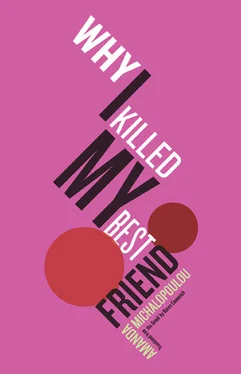Merde. She’s taken it personally.
Under the influence of Christophoros and the rector’s wife, I become a good girl again. I stop watching television entirely, cut down on cigarettes, and start taking art lessons from a guy named Terzis, a painter who drinks so much that he’s destroyed his liver. He’s an odd bird who cancels classes whenever there are anti-government workers’ strikes downtown. I can’t imagine him marching in his combat boots, with his expressionless rat’s eyes and his freakish hair.
“I don’t march,” he says. “Not all problems can be solved through peaceful means.” That makes more sense — I can certainly imagine him throwing Molotov cocktails. But Terzis clams up and won’t say more. “Okay, time to work.”
During the summer of 1986 I take placement exams for the School of Fine Arts, and Christophoros starts his military service. He’s used up all of his deferments. Our parting is dramatic; I make him five mix tapes full of songs about breakups and reunions. Could we possibly live together forever? Could a year of monogamy turn into a lifetime of monogamy? They send him to basic training at a camp by the Evros River, near the border with Turkey, and he calls me, nerves totally shot, after waiting in line with a hundred other conscripts to use the phone. His voice on the other end of the line keeps breaking up. I go out for beers with Terzis. The froth in the glass is unbearably sad. One thing leads to another and before I know it I’m lying naked beside him on his disgusting mattress on the floor. All I remember is his long, yellowed fingers on my body.
“What’s his name?” Anna asks the next day on the phone.
“I call him Terzis. That’s his last name, though, I don’t actually know his first name. Someone called him Camus.”
“Camus? Like the writer?”
“I have no idea. You can’t imagine how ashamed of myself I am! How can I be in love with Christophoros but sleep with Terzis?”
“You’re ashamed of yourself because that’s how you’ve been taught to feel. You’ve been taught that a woman who sleeps with lots of men is easy, while a man who sleeps with lots of women is experienced. You can’t enjoy sex as a purely physical experience, you have to get emotionally involved, otherwise you’re a bad girl. Am I wrong?”
“No, you’re right.”
“And all those men who go out to clubs every night and screw whoever they can find aren’t whores? Besides, at the end of the day, what’s wrong with being a whore? Your body is yours to do what you want with, right?”
“Right.”
“So stop feeling guilty and get yourself over here so we can screw all of Paris!” She holds nothing sacred. I’ll have to cross orthodox Communist off the list, too.
Then what’s left?
Paris glistens in the sunlight. Anna and I are sitting on her big Indian scarf in our favorite spot at Buttes-Chaumont, eating chèvre sandwiches, just like at our picnic on my sixteenth birthday. Anna can’t stop talking about men, she’s become a sex fiend. She tells me about her one-night stand with one of Basquiat’s lovers, and how sex with bisexuals is amazing because they’ve got such serious identification issues that they practically screw you with their mind.
“It doesn’t sound like much of a turn-on. .”
“Oh, Maria! You have no idea what you’re missing!”
“Me? Have you forgotten what you put me through back then with Diana?”
Their place in Paris hasn’t changed a bit. Roman still scrubs the stove as manically as ever. Stamatis still reads in his velvet armchair, a pipe dangling from his mouth. It’s as if not a day has passed since I left. The only difference is that as Anna and I get older, her father starts to behave toward us in an old-fashioned way, as if we were young ladies from another era. “Oh, mademoiselle, welcome,” he says, and kisses my hand. I pull it away; I’m still angry at him. If he’d brought me to Paris as he’d promised, I wouldn’t feel like such a failure.
That night Anna drags me to a bar where all hell’s broken loose: there are women undressing on barstools, men kissing. Anna elbows her way between two total strangers and signals for me to follow. I’m in no mood for planned debauchery. I head downstairs to the bathroom and literally run right into a tall, dark boy with dreadlocks. We both lose our balance and fall in a heap on the stairs, where we start to laugh uncontrollably.
“What’s your name?” I ask.
“Kayo,” he answers.
“Kayo, you smell like Africa.”
He shoves me away.
“No, you don’t understand! I was born in Nigeria.” I hug him, sink my nose into his neck and breathe in the smell of Gwendolyn, grilled suya, soil after a tropical rain. Kayo’s eyes tear up — he must be pretty drunk, too. Then he bends down and kisses my hand.
“Maria!” Anna is standing over me, shouting in Greek: “He’s a complete fag. What’s wrong with you? Can’t you see?”
Kayo and I, out walking, caught in a sudden August rainstorm. We don’t run for cover, just keep strolling along at the same pace. He likes to open his arms wide, lift his face to the sky and spin around with eyes closed in the middle of the Place de la Bastille. “It’s the only way to really feel the rain,” he says. He’s so beautiful that sometimes I pretend my shoe is untied so I can drop back and admire him for a minute. Heads turn when he passes by. Young people, old people, men, women, children, see in his height, in his velvet eyes, in his full lips an embodiment of pride. It’s not just about beauty: Kayo is a real prince, straight out of a fairytale. He can grant you any three wishes, with one exception — that he sleep with you.
Like a true gentleman, whenever we cross to the other side of the street he makes sure I’m still walking on the inside. “It’s how my mother taught me,” he says. With him I forget about feminism and equal rights, because he makes me feel not just equal but better. My own obligations, in return, are to let him lean on my shoulder, to talk to him about Africa, about human rights, about Foucault, and to give him backrubs. Sometimes I can’t stand it and give him a kiss on the neck, and Kayo sighs and says, “Oh, my little African,” which only makes the moment more tender, but when I open my lips in search of something more, Kayo says, “Oh, sweetheart, get it into your head.” Get what into my head? His body responds, it’s warm, he’s always touching me. Why doesn’t he at least try, why won’t he take that risk? “There’s no way,” he says. Anna asks around and finds out it’s the first time Kayo is going around with a girl. She tries to analyze it: “Maybe because you’re tall and skinny, and wear pants and have short hair. Forget him, Maria. He wants to turn you into a boy.”
I cut my hair even shorter and buy a man’s suit. Kayo tells me I look wonderful, asks if I want to submit a portfolio to the modeling agency he works for from time to time.
“Kayo, I hate fashion, advertising, consumer culture. I’m not doing it for the sake of style, don’t you get it? I’m doing it so I can be with you.”
I look at myself in the mirror, trying to see what he sees: my cheekbones protrude, you can see all of my ribs individually, like Antigone’s. There are black circles under my eyes. All I eat is fruit, my stomach has closed up entirely. In the space of a month I’ve become a ghost of myself. I found my prince, only he won’t let me up on the horse.
Kayo is like one of those old-school reporters with connections in every social sphere, from the underworld to upper-echelon government. He finds out when the next Orgapolis meeting is and we go together to a seventh-floor apartment in Ivry. The room has high ceilings and tiny plaster cherubs in the molding. About forty men and women are passing around photocopies. Our connection is Joel, an ex of Kayo’s with eyesight so bad you can barely see his eyes through his coke-bottle glasses. Instead of thinking about politics, I find myself thinking about sex: why him and not me, that sort of thing.
Читать дальше












